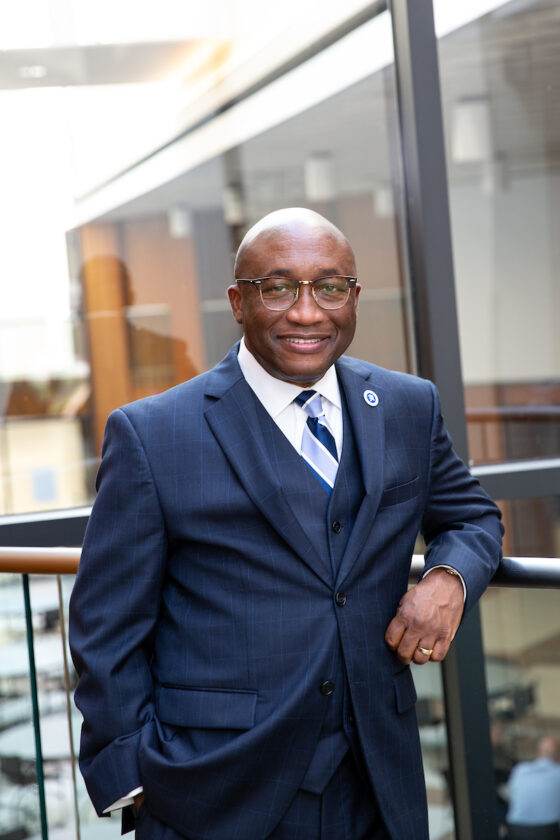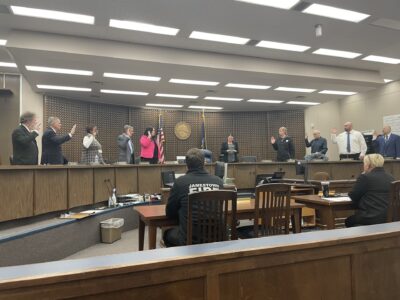SUNY, County Eye Crime Lab For Campus

SUNY Fredonia President Stephen Kolison calls the forensic crime lab effort an “exciting partnership.”
In a groundbreaking collaboration that merges public safety innovation with higher education advancement, Chautauqua County and the State University of New York at Fredonia have announced a joint effort to explore the development of a public forensic crime laboratory on the university’s campus.
Chautauqua County recently issued a Request for Proposals (RFP) to conduct a feasibility study on establishing a forensic crime lab at SUNY Fredonia. The lab would focus on DNA analysis and digital forensics. If realized, the facility would be the first of its kind in Chautauqua County, serving as a critical regional resource for law enforcement.
“This exciting partnership aligns with our Roadmap to Fiscal Sustainability by creating new opportunities that strengthen both our academic programs and our community partnerships,” said SUNY Fredonia President Stephen H. Kolison Jr. “Exploring the development of a forensic crime lab on campus reflects our commitment to innovation and progress. We will move the university forward and provide students with hands-on experiences that prepare them for in-demand careers.”
Hands-on experiential opportunities for SUNY Fredonia students — including mentorships, internships, and job training — would complement efforts to drive enrollment in increasingly popular degree programs like criminal justice and natural sciences.
“This partnership with SUNY Fredonia is a prime example of what’s possible when we think outside the box and commit to bold, forward-thinking solutions,” said Chautauqua County Executive PJ Wendel. “By exploring the development of a forensic crime lab right here in Chautauqua County, we are not only investing in public safety, but we’re also enhancing educational opportunity and regional innovation. We fully support SUNY Fredonia’s forward-thinking vision and are proud to explore this opportunity together. I want to thank President Kolison and his team for their leadership and willingness to collaborate on a project that could benefit our residents for generations to come.”
Currently, local law enforcement agencies in Chautauqua County must send forensic evidence to laboratories located outside the region, creating delays in investigations and increasing costs. “We are a resilient community, finding cost-saving workarounds when finances fall short,” said Chautauqua County District Attorney Jason Schmidt. “There was a time our police could rely on outside forensic labs without delays — but as evidence submissions have surged statewide, those labs now limit what we can send and prioritize their own local cases. These delays challenge our investigations. That’s why we aim to build a local forensic lab — dedicated to Chautauqua County’s needs. SUNY Fredonia is a perfect location, with this lab we hope to expand academic programs, boost student enrollment, and create a win-win for public safety and education.”
A local facility would streamline operations, reduce turnaround time, and expand regional capacity in two growing areas of forensic science: DNA analysis and digital forensics.
“A local forensic crime lab would be an invaluable resource for every law enforcement agency in Chautauqua County,” said Chautauqua County Sheriff James Quattrone. “Right now, we face long waits and significant logistical hurdles when sending evidence out of the area. This initiative has the potential to centralize forensic services, reduce turnaround time, and improve outcomes across the board. I commend SUNY Fredonia and county leadership for recognizing the importance of this partnership.”
The feasibility study, expected to be completed by the end of 2025, will evaluate the costs and logistics associated with either repurposing an existing campus facility or constructing a new, dedicated building. It will also consider site security, staffing models, accreditation requirements under New York State law, and long-term sustainability of the lab.
“From my experience overseeing death investigations and working closely with the County Coroner’s Office, I’ve seen firsthand the critical role forensic science plays in both public health and public safety,” said Chautauqua County Chief Medical Officer Dr. Michael Faulk. “A local forensic lab would not only improve response times but also enhance the accuracy and reliability of casework. I’m pleased to support this effort, which promises to bridge the gap between scientific inquiry and community service in a truly meaningful way.”
Chautauqua County has committed to covering the full cost of the feasibility study if and when a vendor is selected.
“This is the type of high-impact, mission-driven initiative that could transform our community and campus,” Kolison said. “This effort has the potential to give students direct access to state-of-the-art facilities and real-world learning experiences. We’re proud to work alongside Chautauqua County to explore how we can bring this vision to life in service of our region and our students.”
The RFP was open to qualified architectural and engineering firms with expertise in forensic lab development and design. A final decision regarding the feasibility of the lab is expected following a detailed review of the study’s findings.




